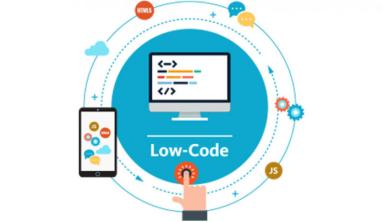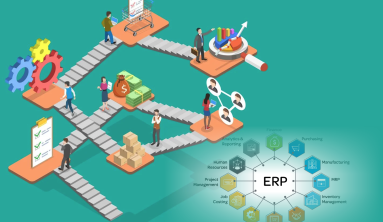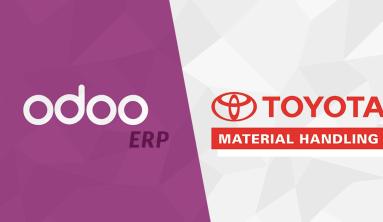You may think when it comes to choosing an enterprise resource planning (ERP) software system to run your business, you have to make a hard choice between on-premises software or a cloud-based solution.
But for many organizations, it may make sense to combine both—an approach known as hybrid ERP. Organizations often adopt this strategy when they already have an established on-premises ERP system; they add newer cloud solutions to support business units or regional groups, or to quickly add new functions without disturbing their current system.
Video: What is Hybrid ERP?
What Is ERP?
ERP software integrates many of the processes essential for managing a business in real time, including inventory and order management, accounting, human resources and customer relationship management. All ERP systems use a single shared database so that employees across the company can rely on the same information.
What Is On-Premises ERP?
With on-premises ERP, you install ERP software locally on hardware in your company’s data center, and it’s managed by your IT staff. You make a substantial capital upfront investment in software licenses and hardware, plus you’ll need time and resources for installation and maintenance.
What Is Cloud ERP?
With cloud ERP, an ERP supplier manages your ERP software and data in the cloud, and your users access the software over the internet using a web browser. Cloud ERP is generally provided in the form of Software-as-a-Service (SaaS): You pay for what you use on a subscription basis.
On-Premises vs. Cloud ERP
On-premises and cloud ERP solutions generally support the same core business processes, but they’re different in many ways. Those differences have important implications for your business. Some of the major differences are in the following areas:
- Cost. With on-premises ERP, you make a substantial up-front capital investment in hardware and software licenses, plus you’ll need time and resources for installation and maintenance. In contrast, cloud ERP is generally provided in the form of Software-as-a-Service (SaaS): you pay for what you use on a subscription basis.
- Speed of deployment. Cloud ERP is generally faster to deploy because there’s no need to install IT infrastructure.
- Technology expertise. To run on-premises ERP, you generally need skilled IT staff to install, manage and upgrade the system. With cloud ERP, your supplier manages and upgrades the system automatically.
- Ease of use. Cloud ERP solutions are often easier to use and require less training.
- Scalability. Cloud ERP and on-premises ERP can generally both scale to support more users as your company grows. But scaling is easier with cloud ERP because you just buy more subscriptions. With on-premises ERP, you may have to install more powerful hardware.
- Features and customization. Both cloud ERP and on-premises ERP systems are generally customized to fit your business. But some on-premises ERP systems have been developed over many decades, so they have acquired very extensive sets of features and are also extremely customizable.
- New features and upgrades. When suppliersincorporate new features into cloud ERP quickly, they immediately become available to you. With on-premises ERP, it takes longer to upgrade because you need to install each new release. Organizations also find that customizing on-premises ERP is a two-edged sword: If you have extensively customized the software, it can be extremely difficult to upgrade to new releases.
- Control. If you need absolute control over where your data is or how you run your software, an on-premises ERP system may be a better fit.
What Is Hybrid ERP?
With hybrid ERP, you use a combination of on-premises and cloud solutions to support your company’s needs. Some of the most common hybrid ERP arrangements are:
Two-tier ERP. Your company continues using the existing on-premises ERP system for corporate functions (tier 1), but adds cloud ERP systems to support some or all business units or regions (tier 2). This two-tier ERP approach can reduce overall cost and allow those groups to move more quickly to meet local needs.
Supporting specific business functions. You may find that cloud solution suppliers provide better support for specific functions, such as CRM or the ability to access ERP features from phones or other mobile devices while on the road (mobile ERP). In this arrangement, you’ll use cloud ERP for those specific functions.

Hybrid ERP Advantages
In the past, many organizations with multiple business groups implemented a single on-premises ERP system across the entire company. The appeal of this approach is that you can share data and support the same business processes across all groups and regions as well as headquarters. In practice, that approach often turned out to be expensive, cumbersome and extremely difficult to implement.
The hybrid ERP approach has become popular because it offers several advantages, including:
- Reduced cost. It’s often less expensive to buy a different cloud ERP system for business groups or regions than to extend a single ERP system across every part of the business; the cost of IT infrastructure and personnel for multiple locations quickly adds up.
- Responsiveness to business needs. Business groups can choose from a wide varietyof cloud ERP solutions with the features they need, enabling them to innovate and meet local requirements faster than if they were to wait for corporate IT to adapt a large, all-encompassing, company-wide ERP system.
- Less complexity. Small units may have much simpler business processes. The workflow at a small business unit with a handful of accounting staff may be very different from the process at a $10 billion division with hundreds of accountants. Forcing the smaller group to adopt the same processes as the larger division may smother it in process complexity.
5 Reasons to Deploy Hybrid ERP
Companies choose a hybrid ERP approach for many reasons—or a combination of them. As you may imagine, those reasons are typically derived from the advantages listed above. Here are some of the most common.
-
Innovate faster for competitive advantage
Cloud ERP suppliers may be faster to add new ecommerce, analytics, social media, internet of things (IoT) and artificial intelligence features than longstanding providers of on-premises ERP systems because new features can be rolled out to the entire customer base at once. Many on-premises software vendors have also added cloud software to their portfolios and are more likely to focus research and development on the newer software. With a hybrid ERP strategy, you can get access to new features for a competitive advantage while continuing to use your on-premises ERP system for slower-changing functions.
-
Meet the needs of specific industries or regions
Business groups can choose from many industry-focused or regional cloud ERP solutions to quickly meet their needs. Some industries in particular, such as digital media and business services, may be better served by newer cloud ERP solutions than long-established ones. Regional units can choose systems that meet local language or tax requirements.
-
Lower cost
Not only is a hybrid ERP strategy often less expensive than extending a single on-premises ERP system to all locations, but it also can improve cash flow because it reduces the need for a large, upfront capital investment.
-
Stepping stone to the cloud
Some organizations use a hybrid ERP strategy as a way to test the value of cloud ERP before committing to using it across the entire enterprise. For example, one manufacturer kept its on-premises financials software but replaced its CRM with a cloud ERP system. Due to the success of that approach, it subsequently expanded its use of the cloud ERP system to cover most business processes.
-
Regulatory compliance
A business group may have specific regulatory needs that can be met more easily with a new cloud ERP solution than by adapting the corporate ERP system. You may also need a separate ERP system for joint ventures or company spinoffs.
Hybrid ERP Data Management Considerations
One big concern with a hybrid ERP approach is that you could lose the benefit of sharing a single database across the entire company. The best cloud ERP solutions address this by including pre-built integration with the ERP systems that organizations already have in place. This integration lets you synchronize data, consolidate financial information and coordinate business processes across different groups.
Via netsuite






